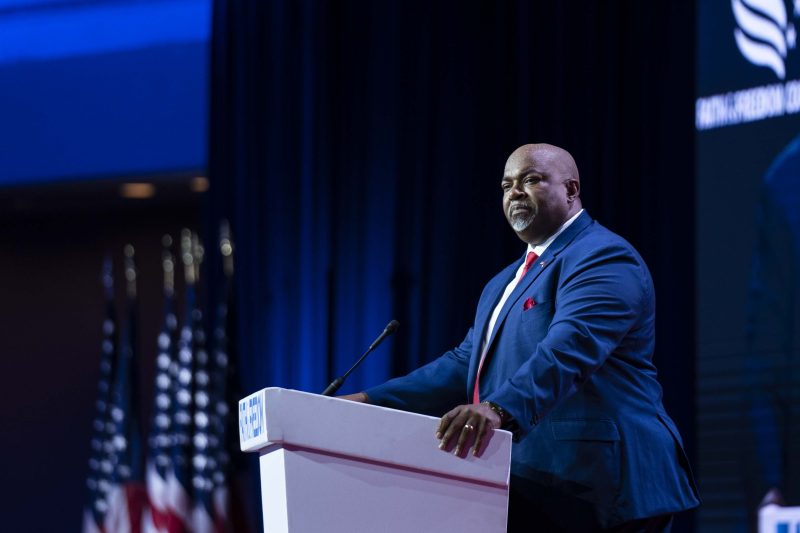
Trans women should be arrested over bathroom use, N.C. gubernatorial candidate says
North Carolina’s lieutenant governor, a leading candidate in this year’s gubernatorial election, said this month that transgender women who use women’s restrooms “will be arrested” and suggested they instead “find a corner outside somewhere.”
“We’re going to defend women in this state,” Lt. Gov. Mark Robinson (R) said at a campaign event. “That means if you’re a man on Friday night, and all of a sudden Saturday you feel like a woman and you want to go in the women’s bathroom in the hall, you will be arrested — or whatever we got to do to you.”
At another campaign stop that same day, he told the crowd that “if you are confused [about which bathroom to use], find a corner outside somewhere. I’m sorry, we’re not tearing society down because of this.”
Robinson’s campaign did not immediately respond Monday to requests for comment from The Washington Post.
The remarks, which were received with cheers and laughter, drew comparisons to the infamous “bathroom bill” North Carolina lawmakers passed in 2016. Polls suggest Robinson is the leading candidate for the Republican nomination for governor in a state where national controversy erupted over legislation requiring transgender people to use public bathrooms matching the gender on their birth certificates.
Robinson was catapulted into the spotlight in 2018, when he spoke about gun rights during a town-hall-style meeting of the Greensboro City Council. His speech was shared by a North Carolina state representative and went viral. He was elected North Carolina’s first Black lieutenant governor in 2020, and in April 2023 announced he was running for governor.
Former president Donald Trump endorsed Robinson in June, and polls indicate he’s ahead of his two GOP rivals competing for the nomination. (Incumbent Gov. Roy Cooper (D) is term-limited and unable to seek reelection; five Democrats are seeking their party’s nomination.)
Robinson’s comments on the campaign trail this month are the most recent in a controversial record that stretches back years. He called the Holocaust “hogwash” in a past Facebook post that he later said was “poorly worded,” WRAL reported. In June 2021, Robinson called the LGBTQ community “filth.” When video of the comments surfaced in October of that year, North Carolina Democrats pressed him to resign, one calling him a “disgrace” and “an embarrassment” to the state. Robinson rebuffed the pressure, saying that he was referring to sexually explicit LGBTQ books he claimed were circulating in North Carolina public schools.
Robinson entered the political arena in the aftermath of the demise of House Bill 2, the so-called bathroom bill. After a year of fierce blowback that included economic boycotts, job losses and public criticism, lawmakers repealed the law in a deal that prohibited local governments from passing measures to protect LGBTQ people.
Since then, gender identity and transgender rights have only grown as a political flash point in the culture wars, becoming favorite targets of conservatives at a national level. Between 2018 and 2022, the number of anti-trans laws across the country skyrocketed.
Alex Baltzegar, a spokesman for Bill Graham, one of the candidates competing against Robinson for the GOP nomination, told The Post that Robinson’s “demeaning comments” about women will not only hobble Republicans’ chances to take over the state’s executive branch but also their efforts to rally support for the party’s eventual presidential nominee.
“His comments about the Holocaust being hogwash along with his demeaning comments about women will wreck GOP chances for regaining the White House and the governorship here in North Carolina,” Baltzegar said.
Robinson’s other Republican rival, State Treasurer Dale Folwell, told The Post that he believes “that only girls should be in girls bathrooms” but criticized Robinson for what he described as fearmongering to enrage people and whip up votes.
“Mark Robinson is history’s latest example of someone trying to rise to power through hate,” he said.
